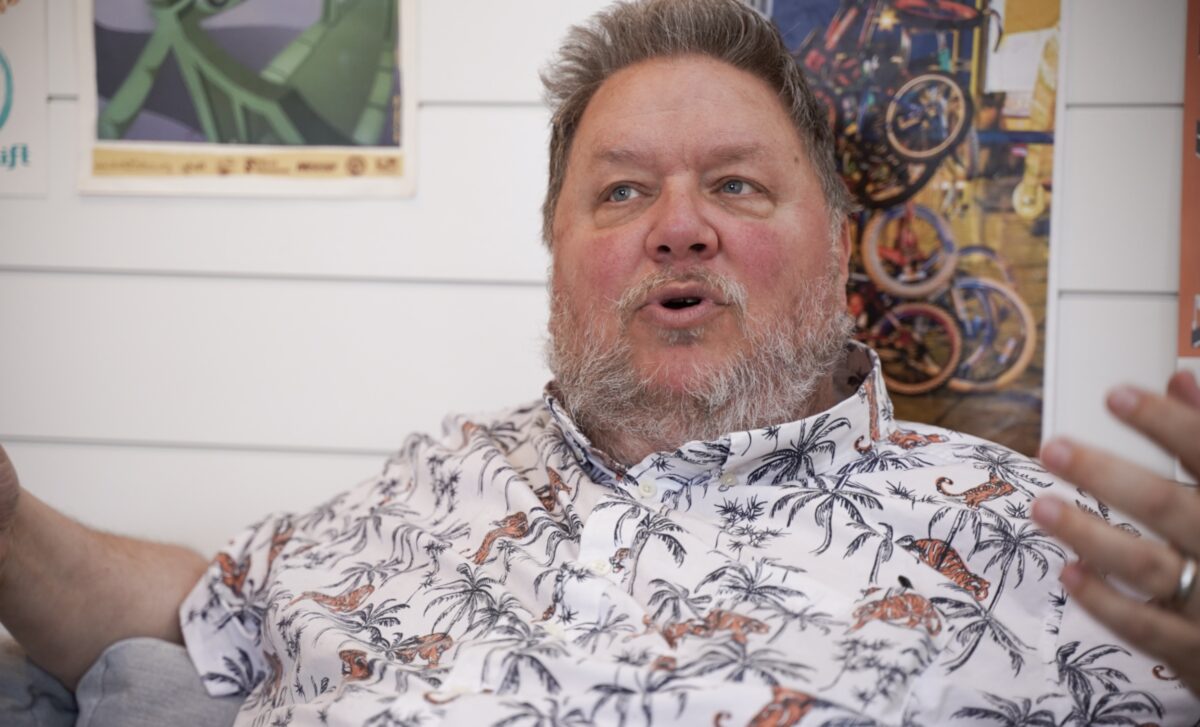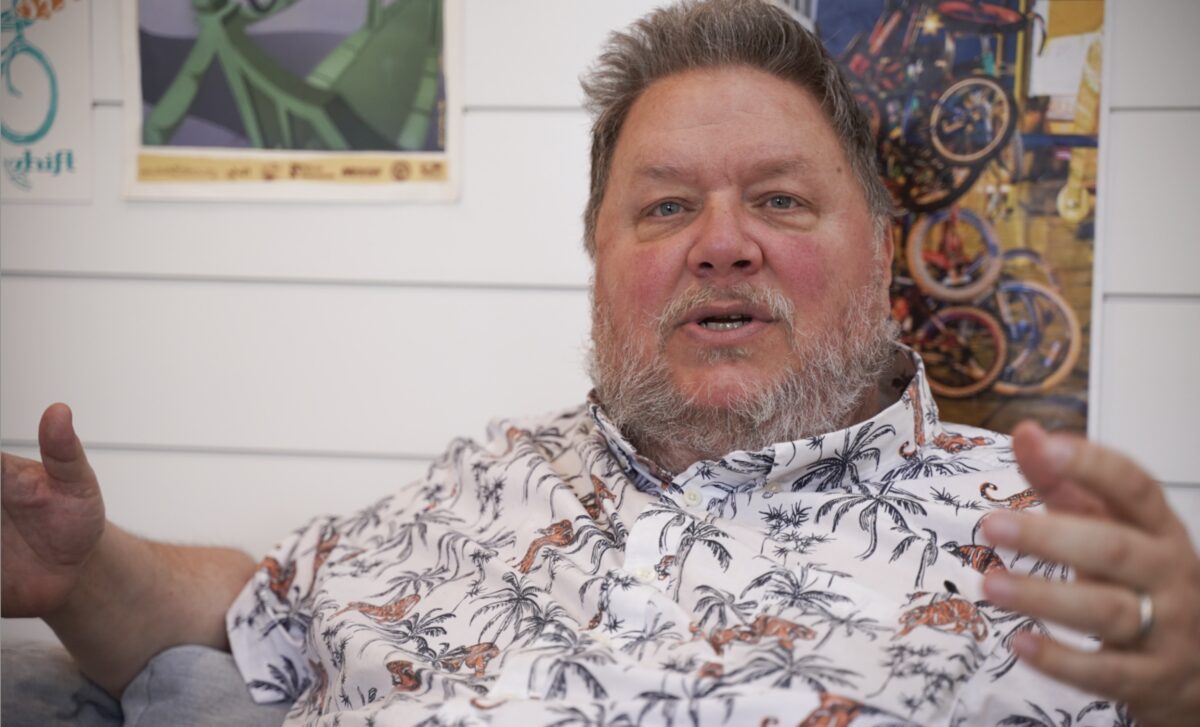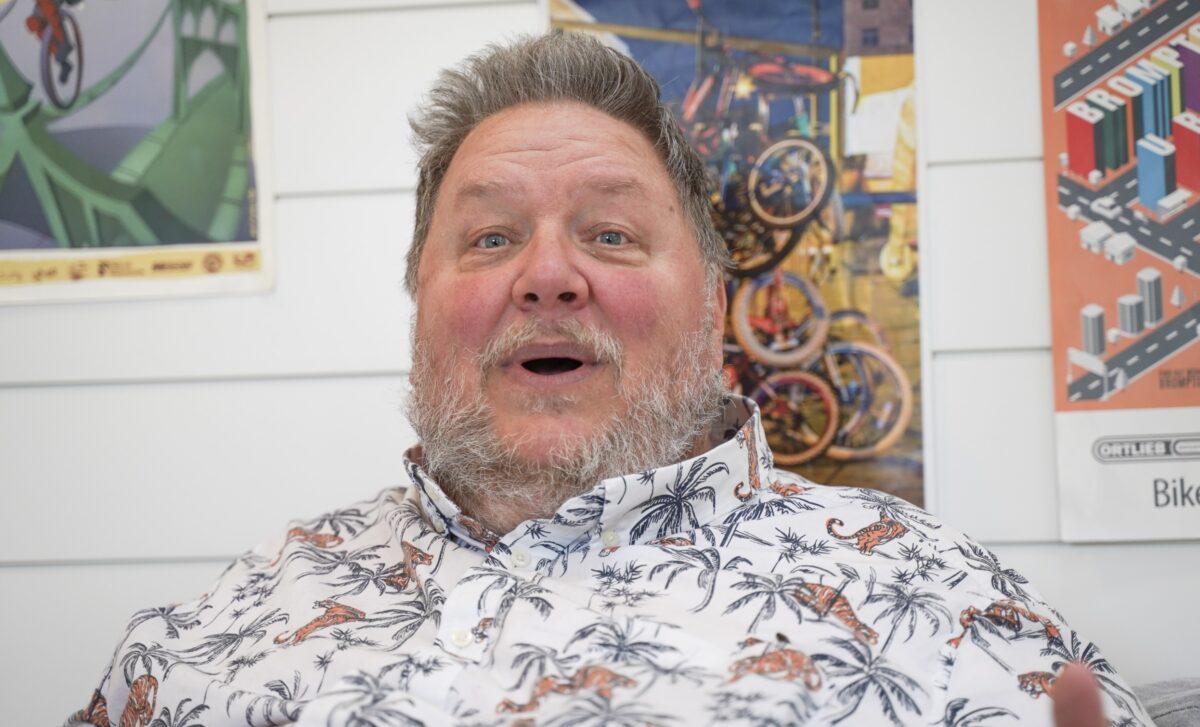Last week, someone I follow online shared a story about something that happened on the bus and it made me realize how much I wanted to sit down and have a conversation with them. That person was Dan Christensen, who you might know as Bus Driver Dan on Twitter.
Dan is a real gem. I’ve known of him since 2008 when he garnered some controversial BikePortland headlines for what I’ll just say were some overly candid personal campaigns related to bike safety. His relationship with our community started off very rocky, but those were early days and people change, and all of that is now water under the bridge. I’ve followed Dan online since then and his Twitter updates and general outlook on life in our city always makes me feel better.
If you’re hoping for a technical conversation about transit policy or infrastructure projects, you might be disappointed with this episode. That’s not why I wanted to talk to Dan. I invited him to the Shed because I wanted to hear what driving a bus means to him, what he’s seen while “watching Portland on the big screen” (his description of the view from his windshield) for the past 16 years, whether TriMet’s bad rap has gotten to him these last few years, his assessment of how people ride bikes around his bus, and lots more.


 Dan Christensen in the Shed, March 24th. (Photos: Jonathan Maus/BikePortland)
Dan Christensen in the Shed, March 24th. (Photos: Jonathan Maus/BikePortland)
A lot of people will say, ‘Well, you know, transit is only like 10% of the population,’ or whatever number they throw out. But what that doesn’t tell the story. Because it’s 10% now; but of young people, it’s like 90%. I don’t know anybody who grew up in Portland that didn’t take the bus at one time regularly. And a lot of it is older people who can’t drive anymore, or who have epilepsy or who have some sort of disability. To them, 90% is the bus.
He ended up sharing some great stories; like how his favorite part of taking the bus to Kennedy School as a kid (yes, that Kennedy School) was when his bus driver (whose name he still remembers) would take them on bumpy gravel roads, the bus driver who inspired him to leave a former job he hated, how he uses his power of observation and belief in nonviolence to do his job better, and much more.
And for those of you who always thank your bus driver before getting off, you’ll definitely want to listen all the way to the end to see if you pass Dan’s “backdoor test”.
Listen to the episode in the player above or wherever you get your podcasts. I’ve shared an edited version of the interview below and will update this post with a full transcript by tomorrow:
Did you take the bus to school? Or what was your first experience taking the bus?
I went to Kennedy grade school… The Kennedy School that’s now a bar and theater and everything. In fact, if you go in the back towards the parking lot, there on the wall is a class picture. I’m in the lower right hand side with the big head. I think my head was the same size in third grade.
I had to take a bus there. And I even know my bus driver was Mrs. Yost, everyone in the neighborhood knows that bus driver! She was fantastic! And if you were really good all week, she would turn off of Killingsworth two blocks early to go down the gravel roads and throw us all over the bus. We would bounce around and it was great.
Hearing that, it’s no too surprising that you had a good impression of what it would be like to be a bus driver. How did you end up working at TriMet?
I worked at a big bank that was prominent in the problems of 2006 to 2008. And so that was driving me nuts. And then I noticed that every night when I got off at Willow Creek to take the train home, there was a bus driver, and she was juggling these glow-in-the dark balls and just relaxing on her break and laughing. Everybody was interacting with her. Everybody was having fun. And I went, ‘I’m want that job. I want a job where on my breaks I walk out and it’s done.’
And that bus driver just retired at 47 years. I even gave her a big hug the other day. And yeah, just totally amazing. She just represents everything good about bus driving,
How has being a bus driver changed you?
Well first of all, I learned more about the city than I ever thought I knew. You learn far more about Portland than you ever thought you’d know… So that’s been one of the fun things is all of a sudden, I know all these little nooks and crannies of the city that I didn’t have a clue existed before. Even after the couple years after I first talked with you, I was still learning. And that hasn’t stopped. I’m always learning. And that’s kind of the fun part of being a bus driver.
And you’re open to it. It’s something that you embrace? You could just close it out and just do your job.
I think that there are drivers who do that to survive. But my coping mechanism is engaging. That’s how I feel better.
So to you, the job is to embrace it not to shut it out?
Yeah.
Do you mind if I read a little thing you wrote the other day on Twitter? I love the little stories you tell. Here it is:
“Meeting people where they are. It’s not just a growing buzz phrase. It’s an essential tool. A rider in tears admitted she missed the hospital stop because her father was in his last hours, and she was afraid. A lady on the bus I called Ms. Flower came over and embraced her, then asked, ‘Is it okay, if we say a prayer for you?’ At the far end of my run, with time to spare, I secured the bus and joined the others crowding around. Ms. Flowers said a wonderful prayer. She empowered others with what she learned firsthand about grief.
Ms. Flowers held her hand until we returned to the hospital, and then gave her a hug before she got off the bus. She thanked everyone.
Understanding what people need and doing your best to meet them there. That makes you a better driver.”
You see the the hero there is Ms. Flowers. That was not about me. It was what I observed. And you know, I used to say, I’m a good storyteller. But I’m really an observer. So this is something I observed in the person who stepped out of her comfort zone to come over and say, ‘Hey, do you need help? Can I say a prayer for you?’ That person was reaching out to her. I supported that. But she was the hero of that story. To do that, for another person you didn’t even know. That was my hero.
How do you feel like your role as a bus driver impacted that situation?
I think people were surprised. I think a lot of bus drivers try to keep that emotional distance, and I don’t fault them. That is a defensive mechanism. But you know, I learned from people like this Ms. Flowers, that you got to have the courage to step out. You gotta say, even if it’s a mistake, even if it’s wrong, you know, there’s been times when I saw someone on the side of the street, and I stopped the bus and checked on them and they screamed at me. One through a half-eaten can of beans at me! But I’m still going to do it. You know, if I see somebody in need, I’m still going to do something.
But [in that story] she made the effort. And I felt my job was supporting her. When I got out of my seat, the other of the bus joined in. And the one guy says, ‘I’m an atheist,’ and he was crying as much as the rest of us were. Because it wasn’t about us, it was about their moment. And what it meant to that lady was phenomenal.
You also sort of believe that there’s something about the bus itself and the act of taking transit, that connects people? You wrote something that really stood out to me when you wrote, “Transit is all of us.” Can you connect the dots between that story and this idea that somehow transit itself — and the shared space of the bus — is important?
A lot of people will say, ‘Well, you know, transit is only like 10% of the population,’ or whatever number they throw out. But what that doesn’t tell the story. Because it’s 10% now; but of young people, it’s like 90%. I don’t know anybody who grew up in Portland that didn’t take the bus at one time regularly. And a lot of it is older people who can’t drive anymore, or who have epilepsy or who have some sort of disability. To them, 90% is the bus.
You’re passing through the bus at different times at different speeds in your life. And it’s different for everyone, but it touches everyone. Even if you never rode a bus, there’s somebody riding a bus to your job. So it is this micro-community in the bigger community. And it has its own rules. It has its own way. Like things people do on the bus, they don’t do just sit standing on the street or walking by each other.
It’s hard to extract what’s really going on. It’s easy to grab a headline. And it’s really easy if you’re one of the people on the internet going, ‘Oh, this is always happening all the time!’ But I talk to drivers who are assaulted and, and no one likes that. No one wants that. Everyone wants to stop that. But it’s not the defining quality of transit, and of people on transit.
I wonder, though if it weighs on you that how some people act on the bus has changed. A lot of people listening to this are thinking it might be less positive than the story you shared. You certainly know that the reputation of transit has not been good these last few years. Does that matter to you? Does it weigh on you at all?
That doesn’t matter to me at all. I try the best I can. I’ve been assaulted. I’ve had problems. But there’s so much to unpack there. Because it’s it’s a simple and easy question to ask. But there’s a lot of layers to it. Because first of all, humans are negatively biased. We’re built with that. You know, ‘Plane lands safely. News at 11,’ you never hear that, right? That’s an old joke. You know, the person that said there’s no lions between here and the waterhole, they got eaten!
No one asks the real question, which is, ‘How violent is our society?’ And, you know, the bus has a slice of society on it. So if there’s violence in society, there’ll be violence in transit. So is transit dangerous? Well, compared to what? Is it compared to just walking down the street? You’re around 300 people on the bus. Are you safer than around 300 random people, you know, standing around a 7/11 at night?
It’s hard to extract what’s really going on. It’s easy to grab a headline. And it’s really easy if you’re one of the people on the internet going, ‘Oh, this is always happening all the time!’ But I talk to drivers who are assaulted and, and no one likes that. No one wants that. Everyone wants to stop that. But it’s not the defining quality of transit, and of people on transit.
Is that part why you share what you do online? To try to and infuse the narrative with something more beautiful or more positive than what people are usually hearing?
I would say this: I have a name for the negative people on Twitter, I call them ‘hose pipes’. They just blow out of a hose, like, anytime something negative happens, they’re ready to jump on board… I observe this negative thing happening, but you’ve got to saw these in half: observation and solution. No city has ever been made better buy people withdrawing. So it gets to a point where you’re just reiterating this avalanche of negativity and that’s never going to fix a city.
Do you think some of your driver colleagues have withdrawn or stopped driving because of some of this negativity?
I don’t know many people that have left just because of that. There could be… I find that people who’ve been disconnected from driving for maybe a decade are far more negative about what’s going on than the drivers I know who are actually doing it now.
OK, switching gears a bit, are there things that bike riders do that make your job harder? Easier?
Well let’s start with 15 years ago, when biking was just booming. I saw a rift between what I call professional commuters — they paid attention, they had lights, they had helmets, they took defensive action, they weren’t worried about who has the right-of-way as they were about just doing what was safe. And then there was a whole bunch of new people who were just starting on that path. So if there were problems, it wasn’t like, this is a problem of all cyclists, it was a problem of these people are starting on this path… they took more risks. And what it did is it sort of put the danger on onto someone else’s plate. When you aren’t riding defensively, you’re basically handing someone else the the gun pointed at your head. And so that was frustrating to a lot of commercial drivers because our vehicles are no joke.
I always joke that the problem is with buses is they named them wrong. They named him too nicely. “Bus” sounds nice. If they would have called it the “crush you kill you” people would treat it a little bit different… It’s no joke. It’s no joke. And people in general — not just cyclists but people walking, people in cars — take more risks around heavy buses, because they anticipate that drivers are going to account for that.
I always joke that the problem is with buses is they named them wrong. They named him too nicely. “Bus” sounds nice. If they would have called it the “crush you kill you” people would treat it a little bit different. It’s no joke.
What about Pedalpalooza? What happens in the summer with those big group rides when there are 500 bike riders rolling by?
Yeah, they’re a different animal. They behave differently and sometimes wrongly, but you know it doesn’t last long. You don’t get Pedalpalooza all day, every day. So I don’t mind waiting.
Between drivers and people on bikes, is there one that makes your job harder or easier? Which, which one is more frustrating to you to drive around?
Well, I’m a little biased now. Because the route I’m on has precious few bikes. The few people that are regular commuters out there, I know and have nicknames for them. I got “yellow top” and “speedo”, and all sorts of them. I’ve kind of got used to the handful of regular riders.
To keep my head in the game, I pretend everybody’s at the lower-end and worse. That way, I’m driving defensively. I’m anticipating, I’m leaving space for everyone. I assume that it’s this person’s first day on the road or the first time they’ve been on a bike. And I am pleasantly surprised when that’s not the case. I tend to get not get into grouping [road users together]. Because then you’re lowering your guard right? And you shouldn’t do that you should always say, ‘I’m here. I’m focused. These people I’m going to assume they don’t know,’ right? And when they do, I’m the first one to wave or at a light stop and say thank you. I love it.
If there’s something you could tell bike riders out there to, you know, do a better job at or just keep in mind or is there anything you want them to hear?
I’d say the secret is that we all get home safe. Not laws, not rules, that you get home safe. That’s above all. I think a lot of cyclists have that feeling like, ‘Oh, of course I do that, I’m the most at risk.’ But you got to drive like that. You got to ride like that. You got to walk like that. You’ve got to be defensive at all times. And just make sure that it’s not a matter of speed. It’s a matter of life. That’s the only thing I focus on is life and safety on the bus… And that’s what really matters.
… It’s life. That’s very precious. And get out to it. You know, we’re getting into the summer times where people really get out and enjoy Portland. That’s great. Yeah, knock yourself out!
Okay, last question: Do you care if people say ‘thank you’ when they get off?
Yes and no. When they say ‘thank you,’ I always say, ‘thank you, my pleasure.’ That’s my tagline. But there is a test. And this has a horrible name. It’s called the backdoor test. We as social beings don’t like to draw attention to ourselves. People will walk by me and go ‘thank you’ upfront, right? That’s fine. It’s quiet. No one hears it.
The person leaving from the back door that yells ‘thank you driver!’ and breaks all the social barriers and says it loud enough for everyone to hear — that person is sending a different message. That’s what I count. I count the backdoor thank-yous. I like all thank-yous of course. It’s pleasant. It’s beautiful. But that backdoor thank-you, when you get the same amount of men thanking you as women, the same amount of Asian people, Russian people, Black people, white people, everybody’s saying ‘thank you’ from the backdoor, you’re doing something right. They’re breaking that taboo and being outspoken in public in front of people they don’t know, to thank the driver as they leave. I literally have counts of those. It’s like, I know I’m doing well, when those counts are high. Then I’m impacting people, because they’re breaking those barriers to say thank you.
This was a very edited version of our conversation. Listen to the entire interview in the player above or wherever you get your podcasts.

If you have questions or feedback about this site or my work, feel free to contact me at @jonathan_maus on Twitter, via email at This email address is being protected from spambots. You need JavaScript enabled to view it., or phone/text at 503-706-8804. Also, if you read and appreciate this site, please become a supporter.

